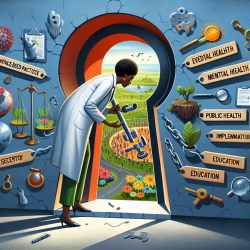Introduction
In the realm of special education and behavioral health, the voices of mothers with intellectual and developmental disabilities (IDD) and co-occurring behavioral health (BH) conditions often go unheard. The recent research article, "Mothers with Intellectual/Developmental Disabilities and Behavioral Health Conditions and Community Experts Provide Recommendations for Treatment/Services, Systems, and Research," sheds light on this marginalized group and offers valuable insights for practitioners.
Key Findings from the Research
The study involved a five-session virtual Ideas Lab workshop series that brought together diverse community experts, including mothers with IDD/BH, to discuss their experiences and set priorities for treatment, services, systems, and research. The participants highlighted two main categories of recommendations:
- Cross-Cutting Themes: These include accessibility, diversity, adverse experiences and trauma, and trust. These themes emphasize how services should be delivered.
- Substantive Themes: These focus on what services should be delivered, including peer support, provider practices and training, and systems navigation/transformation.
Implementing Research Outcomes in Practice
Practitioners can enhance their skills by integrating these research outcomes into their practice:
- Enhance Accessibility: Ensure that services are accessible and tailored to the needs of mothers with IDD/BH. This includes providing educational materials in accessible formats and employing interpreters for non-English speakers.
- Foster Diversity and Inclusion: Embrace diversity by representing Black, Indigenous, and people of color (BIPOC) in the disability sector and including disability as an identity under the diversity umbrella.
- Address Adverse Experiences and Trauma: Build trust with mothers by recognizing their strengths and providing choices in their care. Empower them by advocating for their needs and offering support.
- Promote Peer Support: Develop peer support programs that are staffed by mothers with IDD/BH who have parenting experience. This can provide invaluable support and advocacy for mothers navigating complex systems.
- Improve Provider Training: Train providers to communicate effectively with parents with disabilities and understand the social model of disability. This can improve interactions and outcomes for mothers with IDD/BH.
Encouraging Further Research
The research underscores the need for further studies to expand data on the prevalence, needs, and effectiveness of interventions for mothers with IDD/BH. Practitioners are encouraged to collaborate with researchers to incorporate stakeholders' voices into the research agenda and strengthen researcher training to engage mothers actively and meaningfully.
Conclusion
By embracing the insights from this research, practitioners can play a pivotal role in transforming the landscape of treatment and services for mothers with IDD/BH. The integration of community-driven recommendations into practice not only empowers mothers but also enhances the effectiveness of interventions.
To read the original research paper, please follow this link: Mothers with Intellectual/Developmental Disabilities and Behavioral Health Conditions and Community Experts Provide Recommendations for Treatment/Services, Systems, and Research.










